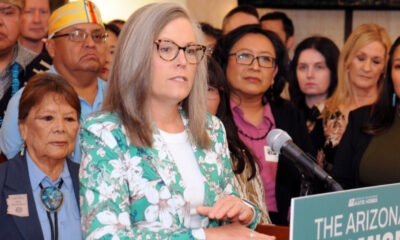alex kolodin
174 Vetoes Expose Arizona’s Divided Government Struggles

Arizona’s state government struggles with bipartisan cooperation, primarily due to a divided legislature. Elected officials often focus more on blocking each other’s proposals than on forging compromises.
Governor Katie Hobbs has signed 265 bipartisan bills into law but has also set a new record for vetoes, rejecting 174 bills this session. This eclipses her previous record from last year, when she vetoed 143 bills backed by Republican lawmakers.
The vetoed measures underwent significant debate and amendment in various legislative committees. Conversely, most Democratic proposals did not receive any consideration.
During the legislative session from January 13 to June 27, lawmakers introduced 1,854 bills. Of these, 1,250 were from Republicans and 604 from Democrats. Ultimately, only 439 bills passed both chambers and reached the governor’s desk, with a meager 10 coming from Democrats.
This disparity partly stems from Republican control over the committee chairmanships. The chairmen, appointed by the Republican Senate president and House speaker, wield considerable power in deciding which bills advance for further consideration.
Frustration among House Democrats escalated after a contentious budget vote on June 26. Republican Rep. Alexander Kolodin proposed a limit on bill submissions, claiming it was necessary due to the volume of legislation. He had submitted 74 bills himself to illustrate his point but faced backlash from both sides.
Democratic representatives voiced their dissatisfaction with the lack of committee hearings for their bills. Rep. Lorena Austin stated that not a single Democratic proposal had been heard in three years, while Rep. Stephanie Stahl-Hamilton noted that her bill was an exception, marking a rare instance of Democratic representation.
Arizona’s legislature currently comprises 56% Republicans and 44% Democrats. Given that only 10 out of 439 bills were introduced by Democrats, their influence on legislation appears significantly limited.
Meanwhile, Republican-sponsored measures faced their own challenges. Governor Hobbs’s vetoes targeted any proposed bills that lacked bipartisan support or sought to enact anti-trans legislation.
Republican Rep. David Livingston took pride in achieving the most vetoes from a single legislator in one day, with 28 vetoes attributed to his proposals. Ongoing conflicts between House Republicans and their Senate counterparts impeded efforts to craft a bipartisan budget prior to the June 30 deadline, leading to extended legislative sessions.
Many bills met their end due to being vetoed or stalled in committee. Both parties struggled with proposals that were often redundant, necessitating further consolidation.
Among the bipartisan bills that gained traction, several noteworthy measures emerged: House Bill 2704 allocates $500 million in sales taxes over 30 years for the Diamondbacks; Senate Bill 1500 offers compensation to wrongfully incarcerated individuals; House Bill 2945 protects essential services for people with disabilities; House Bill 2581 establishes a sexual assault kit tracking system; and House Bill 2281 creates a missing Indigenous person alert system.
Additionally, the legislature endorsed three resolutions, solely supported by Republicans, which will be sent directly to voters for decision in 2026.


















